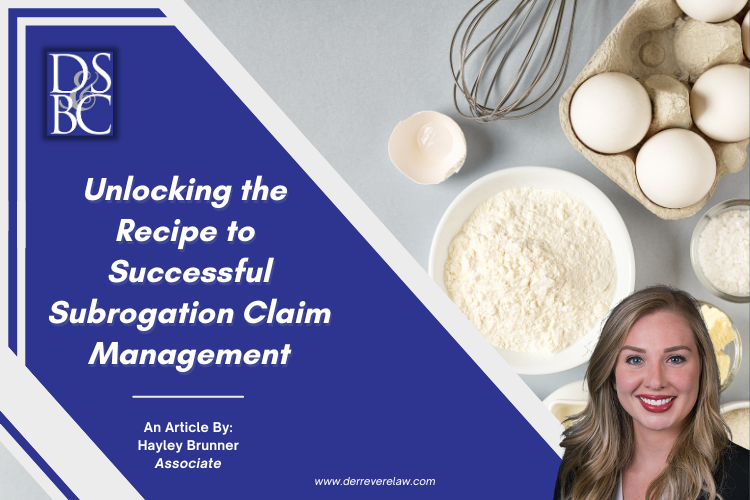June 5, 2023
Unlocking The Recipe to Successful Subrogation Claim Management

As a professional cake artist and baker turned attorney, I like to think of a successful subrogation claim as a perfectly constructed recipe. Some may think that overlooking the smallest detail is immaterial. However, if you forget a teaspoon of baking powder in your beautiful pound cake, the consistency will become heavy, grainy and unappealing. Claims management is no different, and one small miss may be no less detrimental than that missing baking powder.

Properly constructing a subrogation claim is no different than baking that perfectly fluffy and flavorful cake. Just like managing a claim, I like to gather all of my ingredients before I begin measuring and mixing. Similarly, when a claim is first reported, it is crucial to gather all necessary information relating to what happened before, during, and after the loss. You will want to collect every single piece of evidence and facts surrounding the loss. Without doing so, you will likely forget one crucial ingredient necessary to your recipe.
Let’s imagine we’re making a carrot cake. There are so many possibilities of what could be included – do you want raisins or nuts in your carrot cake? Maybe you also want to add some pineapple…I’m just saying, don’t knock it until you try it. Like carrot cake, there are several potential ingredients, or parties that may be to blame for the loss. This is why it is so important to gather every fact and get your insured or client on the phone. In many instances of vehicle fires, it is assumed there is a manufacturing defect; however, without first gathering all of the facts, you may miss that the insured recently had an oil change or repair done by a third-party company. This information will not only be helpful in knowing who to put on notice for any examinations, but also to provide your expert with that golden nugget of information that may lead them to a strong finding and opinion.
In addition to gathering all the facts, you want to ensure that all necessary documents are collected as soon as possible to prevent them from being lost. This may include condominium bylaws, contracts, or invoices/receipts from services. In some instances, these documents may include a limitation or complete bar on subrogation claims. A necessary document may also include a subrogation waiver, if required by the insured’s policy. At the beginning of claim handling, it is important to obtain a subrogation waiver from your insured. Some policies contain language whereby the assignment occurs automatically after any payment is made. Other policies require an additional step from the insured to affirmatively assign their rights to the carrier. Despite the insured having a legal obligation to provide the assignment if requested, it may take weeks or months to contact an insured, which may result in the statute of limitations running.
Just as important as gathering all ingredients, you want to avoid overbaking a cake. No one wants a burnt cake, right? Similarly, we don’t want to sit on a claim too long before gathering the evidence, providing notice to adverse parties, getting an exam performed, and retaining an attorney. The longer you wait to examine the evidence, the more likely it will be lost or tampered with, resulting in the integrity of your claim being compromised. Additionally, when it comes to negotiations, attorney involvement can place pressure on an adverse party and ensure a timely settlement. If we overbake a claim and do not involve an attorney within a reasonable time before the statute of limitations runs, the ability to negotiate may be negatively affected.
Like overbaking a cake, underbaking can be equally detrimental. So, when is the right time to send a pre-suit demand? It is never too early to serve a contractor with notice of a potential claim. Chapter 558 of the Florida Statutes provides a notice requirement for all construction defect cases. You must provide a contractor with notice via certified mail and an opportunity to inspect and fix the alleged defect. Failure to do so may be detrimental to your case. As to other claims, presenting a claim to an adverse party without proof of payments, invoices, pictures, and potentially expert reports will result in an early denial that may be difficult to have reconsidered.
If your claim is denied and the question is whether to close it out, file arbitration, or file suit, ask yourself if placing this case into trial is worth the risk of not settling with the offer on the table. You may have a family recipe for brownies and come across a new recipe that is fudgier and more chocolatey than your family recipe. Know when to toss that old recipe and replace it. Don’t become so attached that you sacrifice your great baker reputation! Some claims are better than others, if the facts and evidence aren’t there, it may be time to close it out and move on to better and tastier things.

